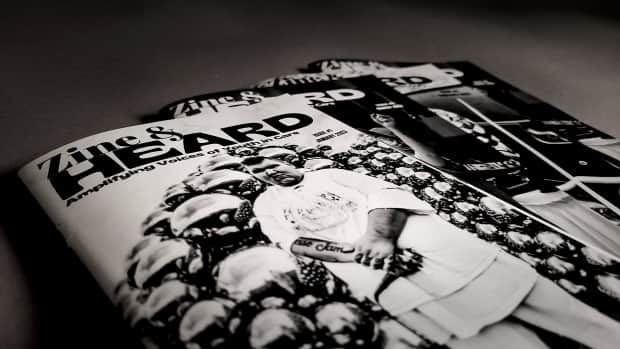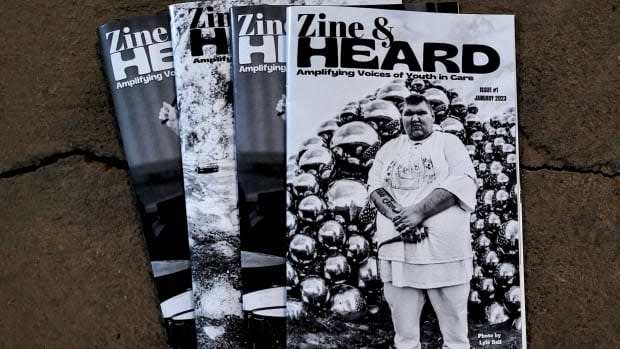74% of youth in care in Alberta are Indigenous. Here's what 2 of them had to say

A new underground magazine circulating in Edmonton is sharing stories from youth in care — in their own words.
Zine & Heard, edited by youth advocate Penny Frazier, shares stories, art, tattoos and more from former youth in care.
In any given copy of the "punk rock-style" magazine (as described by Frazier) featuring poems, pictures and personal stories, you can also find statistics showing the grim realities facing youth in care.
That includes numbers like youth in care or transitioning out of care in B.C. between 2011 and 2016 died at five times the rate of other young people.
And in Alberta, like Canada as a whole, Indigenous youth are overrepresented in the child welfare system. As of December 2022, 74 per cent of youth in care in Alberta were Indigenous, even though they make up just 10 per cent of the youth population.
"With all of those stats combined, it doesn't make sense that I'm sitting in the position that I'm sitting in," said Cassie St. Germain, 26, who is Cree and Métis.
She said she hopes to contribute to an upcoming issue of Zine & Heard, although she described her experience in the child welfare system as "moderate."
St. Germain said her memories of her family home involve her parents fighting. She and her siblings were malnourished and didn't attend school or "know how to speak properly," she said.
When she was five, she and her two older brothers were taken into custody. Their belongings were gathered up and put in a garbage bag when service workers arrived.
"We were all taken at the same time in the middle of the night. It was really scary," she said.
While that scene is familiar to many for youth in care, St. Germain said much of her experience with the foster care system was atypical. She and her brothers ended up in the same home and lived there for nearly a decade.

Her foster parents — who she now calls "mom" and "dad" — were a positive influence, but she said growing up was still lonely and difficult.
By the time she was 16, St. Germain said she was using drugs and struggling with her mental health (she said doctors now believe she has bipolar disorder) which led to a placement breakdown. She was then removed from her foster parents' home.
"Just being abandoned like that, that was really painful," she said.
"It was probably about as painful as the initial apprehension itself."
St. Germain eventually reestablished a relationship with her foster parents and got involved with a youth advocacy group, Youth Speak Out, working to get proper luggage like suitcases and duffle bags for youth who are being moved, which she said is important for a child's dignity.
"Having your stuff bagged up into garbage bags and then you're just shuttled around, it just makes you feel like an object and it makes you feel dehumanized," she said.
That advocacy work led to full-time work with Crisis Diversion Edmonton, which connects with people experiencing poverty, addiction and mental illness.
St. Germain said she often encounters other former foster kids on the street, which is a bittersweet experience.
Being able to empathize with the people she helps feels good, but she said it's frustrating and sad to see them struggle.
'Hurt people do stuff'
Like St. Germain, Jesse Koenig knows other former youth in care who are currently struggling.
"I've known a lot of youth that are now incarcerated… or passed on or in downtown Edmonton, homeless," Koenig, 28, said.
"I strive to this day just to live a normal life."
He said he hopes to help others by sharing his story through his music — he's in a band called Jesse Jams and the Flams — and Zine & Heard.
The trauma of being in care takes a toll on youth and can lead to common issues like addiction and crime, he said.
"Lack of being heard, being judged, racism that all plays a part," Koenig said.
"We don't feel good and hurt people do stuff that is not that is not necessarily good."

Koenig, whose mother is from Samson Cree Nation 90 kilometres south of Edmonton, said his time in the system was "rough," and his mental health needs weren't always met.
Since leaving foster care, Koenig said he has been diagnosed with personality disorder.
"That made it very rough for me and I just felt like I didn't belong anywhere," he said.
"With my identity, too, it just made it even worse."
As an Indigenous youth and member of the LGBT community, Koenig said he would have liked to have access to cultural supports, but they weren't easily accessible at the time.
From age 11 to 18, he was in several youth homes and then several more group homes as an adult.
He now lives independently in housing supported by NiGiNan Housing Ventures, an Edmonton-based non-profit that provides affordable housing to Indigenous people.
"I've picked up some cultural practices and I feel like it's really helping me," he said.
However, his parents are "not doing well themselves," he said, making it difficult to navigate the adult world on his own.
Like St. Germain, Koenig hopes speaking about his experiences will provide a positive example for others.
"I'm just hoping to actually heal somebody … Just let them know that they're not alone," he said.


